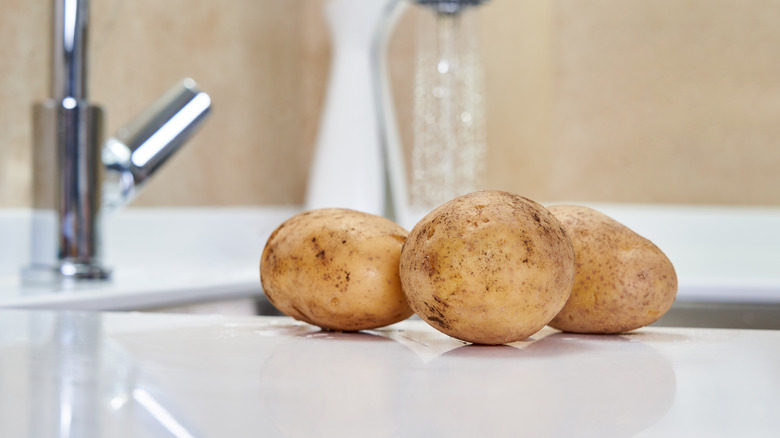Can You Zap Away Bathtub Rust With Just A Potato?
Metal bathtubs, whether cast iron or aluminum, have a way of adding subtle elegance to your space. Plus, they are usually more durable and have higher heat retention than ceramic tubs. Unfortunately, one downside to these tubs is that some of them could rust with time.
But you don't need to give up on your tub yet because there are several DIY tricks that can help you remove rust. One of these rust-removing methods involves using a potato. At the core of the method is oxalic acid, a naturally occurring compound found in many plants, including potatoes, rhubarb, and spinach. When oxalic acid comes into contact with rust, it reacts chemically and begins breaking down the rust molecules. This process loosens the rust from the metal surface, making it easier to scrub away.
This simple household hack is backed by chemistry, not just internet noise. So yes, when used properly, a potato is another common kitchen ingredient that can tackle rust naturally. Pair this natural acid with a mild abrasive like baking soda or salt, and you've got a homemade rust remover that's not only safe but also environmentally friendly.
How to remove rust from your bathtub using a potato
If you're curious to try this eco-friendly trick for yourself, here's a breakdown of how to remove unsightly rust from your bathtub using a potato. Grab a potato and cut it in half, then dip the exposed side in baking soda or salt, or apply a little dish soap. Baking soda and salt add texture and boost cleaning power, while dish soap helps break up any oil or grime around the rust. Start scrubbing by pressing the potato's cut side onto the rust spot and scrub in small, circular motions. You'll likely see the potato start to discolor as it lifts the rust. To refresh the potato when it becomes too slimy or clogged with rust particles, slice off a thin layer to reveal a fresh surface. Add more baking soda or soap and continue. Once the rust starts to fade, rinse the area with clean water and wipe dry with a soft cloth. Tougher stains may require several rounds, so you'll need to be patient and persistent.
Since copper and aluminum tubs don't typically rust, this tip is mostly for enameled steel and cast iron bathtubs, which are prone to rust if their enamel coating becomes damaged. It also works well on rusted chrome or steel fixtures. You should note, though, that this trick is best for surface-level rust. If your tub has deep, flaking corrosion or rust that keeps returning, it's probably time to seek professional repairs, resurfacing, or even consider replacing parts.

